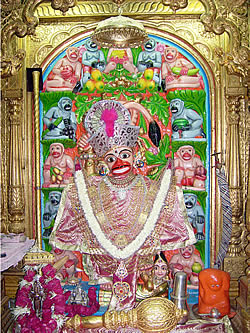Exorcist
Exorcism is a religious or spiritual practice of evoking and controlling, or expelling demons or other spiritual entities from a person or an area they are believed to have possessed. The concept of exorcism exists in various religions, including Christianity, Islam, Hinduism, and Buddhism, though the practices and beliefs surrounding exorcisms can vary significantly among these faiths.
Overview[edit | edit source]
In Christianity, an exorcist is a person who is believed to be able to cast out the devil or other demons. A priest, a person specially trained and sanctioned by the church, often performs the rite. The Roman Catholic Church has formal guidelines for exorcism in the Rituale Romanum, a book outlining the Roman Rite of Exorcism, primarily performed in cases of what is believed to be demonic possession. The practice is less formal in other branches of Christianity, but it generally involves prayers, commands, and rituals to drive out evil spirits.
In Islam, exorcism is referred to as ruqyah, and it involves the use of prayers, verses from the Quran, and names of Allah to heal the possessed person. It is performed by a person known as a raqi, who has a good knowledge of the religion and is believed to be pious.
Hindu exorcism practices vary by region and involve rituals that include the use of mantras, prayers, and offerings to the deities. The person performing the exorcism is typically a priest or a tantrik, who is believed to have the power to control and expel the evil spirits.
Buddhism also contains rituals for dealing with harmful spirits, with practices varying significantly across different cultures and sects. These rituals often involve the use of mantras, mudras (hand gestures), and visualizations to protect individuals from harm or to pacify malevolent entities.
Cultural Impact[edit | edit source]
Exorcism has been a subject of fascination and controversy throughout history, often depicted in literature, film, and television. The cultural depiction of exorcism can vary widely, from horror movies portraying dramatic possession cases to more nuanced discussions of spiritual beliefs and practices.
Controversy and Criticism[edit | edit source]
The practice of exorcism has faced criticism from both within and outside religious communities. Critics argue that what is often considered demonic possession may be mental illness or medical conditions that require psychiatric or medical treatment rather than a religious rite. There have also been concerns about the potential for abuse in exorcism practices, including physical and psychological harm to those undergoing the rite.
Conclusion[edit | edit source]
Exorcism remains a complex and controversial topic, deeply rooted in religious tradition and cultural practices around the world. While it continues to be practiced in various forms, it also prompts important discussions about the intersection of religion, health, and the understanding of mental and spiritual well-being.
Search WikiMD
Ad.Tired of being Overweight? Try W8MD's NYC physician weight loss.
Semaglutide (Ozempic / Wegovy and Tirzepatide (Mounjaro / Zepbound) available. Call 718 946 5500.
Advertise on WikiMD
|
WikiMD's Wellness Encyclopedia |
| Let Food Be Thy Medicine Medicine Thy Food - Hippocrates |
Translate this page: - East Asian
中文,
日本,
한국어,
South Asian
हिन्दी,
தமிழ்,
తెలుగు,
Urdu,
ಕನ್ನಡ,
Southeast Asian
Indonesian,
Vietnamese,
Thai,
မြန်မာဘာသာ,
বাংলা
European
español,
Deutsch,
français,
Greek,
português do Brasil,
polski,
română,
русский,
Nederlands,
norsk,
svenska,
suomi,
Italian
Middle Eastern & African
عربى,
Turkish,
Persian,
Hebrew,
Afrikaans,
isiZulu,
Kiswahili,
Other
Bulgarian,
Hungarian,
Czech,
Swedish,
മലയാളം,
मराठी,
ਪੰਜਾਬੀ,
ગુજરાતી,
Portuguese,
Ukrainian
Medical Disclaimer: WikiMD is not a substitute for professional medical advice. The information on WikiMD is provided as an information resource only, may be incorrect, outdated or misleading, and is not to be used or relied on for any diagnostic or treatment purposes. Please consult your health care provider before making any healthcare decisions or for guidance about a specific medical condition. WikiMD expressly disclaims responsibility, and shall have no liability, for any damages, loss, injury, or liability whatsoever suffered as a result of your reliance on the information contained in this site. By visiting this site you agree to the foregoing terms and conditions, which may from time to time be changed or supplemented by WikiMD. If you do not agree to the foregoing terms and conditions, you should not enter or use this site. See full disclaimer.
Credits:Most images are courtesy of Wikimedia commons, and templates, categories Wikipedia, licensed under CC BY SA or similar.
Contributors: Prab R. Tumpati, MD


